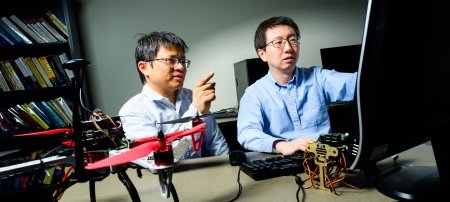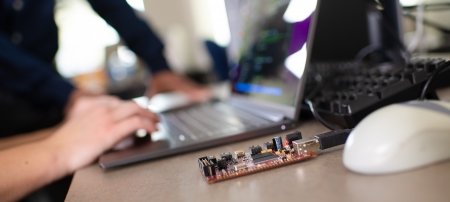Award-winning cybersecurity initiatives and R1 designation put Tech on the leading edge. Meanwhile, our Center for Artificial Intelligence creates an incubator for AI breakthroughs and a graduate student customizes her career through explorations of computer science, psychology, and data science.
Bhakta Rath Award Winners Help Keep Sensitive Data Safe
For their work to ensure that information on mainstream mobile devices can be stored securely and deleted permanently, Bo Chen, associate professor of computer science, and graduate student Niusen Chen were honored with Michigan Tech's 2024 Bhakta Rath Research Award.
The research duo worked with a team of collaborators to develop the first plausibly deniable encryption (PDE) capability for everyday computing devices. PDE goes beyond protecting data. It hides the data's existence, even in situations where the decryption key is leaked. PDE systems are considered increasingly important as more and more people store sensitive information on their mobile devices.
Researchers also confirmed and addressed the possibility that sensitive data remnants can exist within flash storage and be resistant to conventional secure deletion techniques. They created what they describe as a "fresh secure deletion capability for mobile devices that meticulously manages these remnants, guaranteeing the complete and irreversible removal of confidential information from mobile devices."
"PDE is employed to safeguard data throughout its lifecycle. On the other hand, secure deletion is crucial for eliminating outdated or no longer needed data, preventing unauthorized access after its useful life," said Niusen Chen. "Incorporating both strategies in modern computing devices is essential, as it addresses comprehensive data security challenges. This dual approach ensures that sensitive information is shielded both during active use and upon its disposal, thereby fortifying the overall data protection framework in today's digital environment."
In a letter of support for their nomination, Yang-Wai Chow, an Australian researcher who was not involved in the project, said that Bo Chen and Niusen Chen's work has impacted and inspired his own endeavors. "Their research will significantly benefit billions of mobile device users in the world," said Chow, who is an associate professor of engineering and information sciences in the School of Computing and Information Technology at the University of Wollongong.
The Bhakta Rath Research Award, founded in 2010, is presented to a graduating Michigan Tech PhD student and faculty advisor "who have done something valuable for American industry and society," encouraging faculty and doctoral students to conduct research that meets the nation's needs and the challenges of emerging technologies.
Learn more about PDE in a Michigan Tech News Q&A with the researchers.
Michigan Tech Awarded R1 Classification Reserved for Nation's Leading Research Institutions
Michigan Technological University has been designated by the Carnegie Classification of Institutions of Higher Education as an R1 research institution, formally placing Tech among the top research universities in the country.
Since 1970, the Carnegie Classification has been the leading framework for comparing and grouping accredited and degree-granting institutions. Carnegie's R1 status is awarded to doctoral universities for excellence in research activities at the highest level. In 2025, only 187 institutions nationally are recognized as R1 universities.
"By remaining true to the mission of Michigan Tech's founding charter, we've joined the top tier of the nation's research institutions while serving the needs of Michigan industry," said Michigan Tech President Rick Koubek. "While we did not change who we are or what we do in pursuit of R1 designation, we are certainly proud to be recognized for the exemplary work our faculty and staff are doing in research and education, and we are excited for the opportunities that R1 status brings."
Michigan Tech Recognized for Exceptional Community Outreach in Cybersecurity Awareness, Online Safety
This spring, Michigan Tech was among the 10 Centers of Academic Excellence in Cyber Defense (CAE-CDs) chosen to receive the 2024 CAE-CD Community Outreach Award. The award highlights the College of Computing's exceptional community outreach efforts "to encourage and promote cybersecurity awareness and online safety practices."
Michigan Tech ranked fifth out of 57 total CAE-CD institutions whose 2024 outreach activities were considered. This is the second consecutive year that the University has received this prestigious recognition, marking a continuous improvement from Tech's eighth-place ranking in 2023.
Michigan Tech is a National Center of Academic Excellence in both Cyber Research (CAE-R) and Cyber Defense (CAE–CD), designated by the US National Security Agency. Michigan Tech is the only institution in Michigan to hold both designations, underscoring the University's leadership and academic excellence in cybersecurity research, education, and outreach. Michigan Tech has held the CAE-CD designation since March 2023 and received the CAE-R designation in May 2024.
"CAE-R designation gives us access to many federal cybersecurity research grants, boosts our national recognition and elevates our position in the cybersecurity research field," said Bo Chen, associate professor of computer science and chair of Tech's CAE-R designation committee.
Leaders in cybersecurity from across the University served alongside Chen as committee members, including Yu Cai, professor of applied computing; Jean Mayo, professor of computer science; and Chee-Wooi Ten, professor of electrical and computer engineering.
Dennis Livesay, Dave House Dean of Computing, said the designations are a part of a University-wide effort to grow College of Computing cybersecurity research and degree programs, including the creation of an online Foundations of Cybersecurity graduate certificate.
"The CAE-R designation supports an environment in which students and researchers can share and collaborate and confirms Michigan Tech's readiness to make meaningful contributions to the nation's cyber defense," said Livesay.
The designation recognizes Tech as meeting rigorous requirements set forth by the NSA and extends through the 2029-30 academic year.
The CAE-CD designation lasts through the 2027-28 academic year, promoting and supporting quality academic programs of higher learning designed to grow the nation's cyber workforce and help to ensure the country is better prepared to defend against cyber threats and attacks.
"CAE-CD designated institutions are recognized as leaders in cybersecurity education and research, and graduates of CAE-CD programs are highly sought after by employers in the cybersecurity field," said Cai, who led the CAE-CD effort. "This recognition can help to attract students and faculty members, as well as funding and collaboration with government agencies and industry partners."
Dan Fuhrmann, chair of the Department of Applied Computing, noted that the CAE-CD designation distinguishes Michigan Tech as one of 300 institutions in the country with high-quality academic programs in cybersecurity.
Center for AI Up and Running
Michigan Tech's Institute of Computing and Cybersystems launched the Center for Artificial Intelligence in October at the annual Computing [MTU] Showcase. The center is a hub for departments, colleges, industry partners, community organizations, and other stakeholders to catalyze interdisciplinary AI research initiatives.
30
12
$12.8M
Center researchers are working on fundamental advances in AI and crosscutting research in areas including transportation, materials design, health informatics, and climate resiliency. Additionally, the center is preparing a generation of AI professionals through educational programs and professional development activities to promote ethical and trustworthy AI development and use.
Center Director Vinh Nguyen said Tech's ability to bring the research community and industry together to address the exponential growth of AI—and especially its implications for Industry 5.0—is a distinct advantage.
"At Michigan Tech we have the ability to be nimble," he said. "It's easier to find out what people are doing. What I see is not just bringing Michigan Tech faculty together, but also communities in the UP and the state of Michigan."
Computer Science, Psychology, and Data Science Help Husky Chart Her Own Course
Hunter Malinowski followed in the footsteps of family members who attended Michigan Tech, but also found ways to blaze her own trail.
Malinowski '24 '25 made her Michigan Tech experience unique by pursuing dual undergraduate degrees in computer science and psychology and diving into research. A meticulous planner, she also discovered that embracing the unexpected can lead to exciting opportunities—like earning her accelerated master's in data science.
Deciding to Attend Michigan Tech
Malinowski visited Tech during her sophomore year in high school to explore degree options in person. At the time, she was set on a psychology major. "I toured the psychology department and I really enjoyed it because they had a ton of cool research going on," she said.
The summer before her senior year of high school, Malinowski attended Women in Computing Sciences, a Summer Youth Programs exploration, to get a taste of college life and other course options. "I felt at home on campus. I liked the area and I thought the dining hall food was really good!" Malinowski said.
In her ensuing undergraduate years at Tech, Malinowski explored relationships between psychology and computer science, discovering how the two disciplines enhance each other.
"The more I've done with psychology and computer science, the more I realize how many connections there are, from designing a website to the user interface and user experience," Malinowski said. "I want to go into the data science/machine learning field. I think there's a lot to be said about the psychology perspective for that."
Research Opportunities Begin Right Away
During her first year on campus, Malinowski became part of the research community that excited her when she visited Tech as a high school student. She conducted AI-related research with several faculty members in the Department of Computer Science and Department of Psychology and Human Factors and completed a research internship through the Pavlis Honors College's Undergraduate Research Internship Program. "It goes to show how supportive the professors are here, which is one of the best parts of my college experience," she said.
In summer 2023, Malinowski took on more research on a topic that's near and dear to her.
"I worked on a project with Dr. Briana Bettin, Dr. Laura Brown, and Dr. Leo Ureel to create a College of Computing Resource Hub for students. This was one of my favorite projects, as it created a resource that was immediately useful to the community around me," Malinowski said. "There's a lot of disparity in precollege programs in terms of computer science. I was lucky enough to have many choices for computer science programs in my high school, but not everyone has that same advantage or knows that they want to go into computer science."
"Making computer science more accessible is something that I'm passionate about, so the impact of working on a tool that can do that was really important to me."
From internships to leadership, Malinowski packed unforgettable experiences into her time at Tech. "It's hard to pick just one memory," she said. "I think some of my favorite memories have been the little things. Ironing snow on our statue site with my sorority—never in my life did I think I would have a need to iron snow. Spontaneous late-night trips to see the northern lights. … Attending summer music festivals with my friends from Tech. … All of those smaller things have truly added up to be the biggest moments."
After completing her studies in April 2025, Malinowski embarked on her next adventure as a backend developer for the loyalty team at Domino's Pizza headquarters in Ann Arbor, Michigan.
For more on Malinowski's Tech experience, from her Husky family tree to how Pavlis Honors College enriched her personal and professional growth—head over to Stories from Husky Nation.
Michigan Technological University is an R1 public research university founded in 1885 in Houghton, and is home to nearly 7,500 students from more than 60 countries around the world. Consistently ranked among the best universities in the country for return on investment, Michigan's flagship technological university offers more than 185 undergraduate and graduate degree programs in science and technology, engineering, computing, forestry, business, health professions, humanities, mathematics, social sciences, and the arts. The rural campus is situated just miles from Lake Superior in Michigan's Upper Peninsula, offering year-round opportunities for outdoor adventure.







